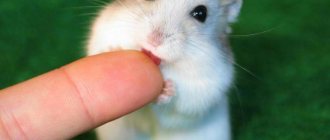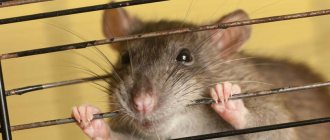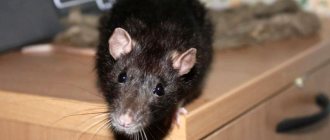Decorative rats can suffer from mange even with proper care - the reasons for this are varied, from nutritional disorders to allergies. Scratching on the skin can also be a sign of a number of diseases. What to do if a rat itches until it bleeds? First you need to examine the animal for other signs and observe its behavior. There are several common causes of scabies that can be quickly identified by additional symptoms.
Stress
Most often, this reaction manifests itself when purchasing an animal, but an adult ornamental rat can also experience stress when its usual conditions change. In this case, itching on the skin is caused by nervous tension. Usually the rat not only itches, but also shows signs of anxiety and panic - it runs around the cage, or, on the contrary, hides in the house and loses its appetite. The best solution is to identify the cause and remove the irritant, and let the rat rest, start adding vitamins and the Anti-Stress drug to the normal diet.
IMPORTANT: If you have just brought home a new animal, it needs to be rested for at least three days. Place a house in the cage where the animal can hide, and do not try to pick it up. Most rats begin to come out of hiding and actively explore the cage on the second day. But if you come across a timid little rat, you may need a much longer period.
Common rodent diseases: symptoms
The following diseases are more common in veterinary practice according to call statistics. Symptoms are not always specific, so the help of a veterinarian is required in any case.
Respiratory diseases
VGB provokes a virus that affects the hematopoietic organs. Hemolytic disease is manifested by symptoms of respiratory failure, bleeding from the mouth, anus, and nose.
Bronchosepticosis is characterized by the appearance of serous-purulent nasal discharge. In the absence of treatment and the addition of bacterial microflora, the disease quickly develops into pneumonia. Symptoms: apathy, insufficient functioning of the cardiovascular system, anorexia, the death of the animal occurs from exhaustion within 1-2 months.
Tuberculosis is suspected if there are enlarged lymph nodes, skin ulcers, or a cough with the release of a specific secretion.
With mycoplasmosis, red, dried crusts appear on the nose, a consequence of the formation of porphyrin. The disease often provokes respiratory pathologies and is characterized by wheezing that lasts more than 1 day. Symptoms: whistling, snoring, sneezing. Breathing is difficult; the intercostal muscles are activated during breathing. Rats and mice die if left untreated.
Pasteurellosis is a bacterial infection that affects the respiratory system. A cough, tachycardia, and rapid pulse develop. A purulent secretion forms in the nasal passages.
Aspergillosis develops due to the penetration of fungal spores into the lungs. The mycelium grows, specific nodules and foci of necrosis are formed. Breathing is difficult, the cardiovascular system is malfunctioning.
Symptoms of rhinitis do not always indicate infectious diseases. Mucopurulent discharge, snoring, and sneezing may indicate neoplasms of various locations, allergies, pulmonary edema and pulmonary insufficiency.
Heart diseases
Rats and mice suffer from arrhythmia, cardiomyopathy, and dysfunction of the heart valves. Visually at home, it is almost impossible to determine CVS pathologies based on symptoms, so they are diagnosed in most cases posthumously. Heart abnormalities are caused by respiratory diseases, systemic pathologies and tumors.
Characteristic features:
- lethargy, apathy, anorexia;
- body position – head tilted up to facilitate breathing;
- the rodent is almost constantly asleep;
- swelling in the joints of the paws not associated with damage;
- dry heart cough.
The urine becomes dark, smells bad, and is rich. During the examination, cyanosis and coldness of the mucous membranes and skin of the peripheral parts of the body are noted. A timely consultation with a veterinarian will help alleviate the pet’s condition and prevent death.
Urological pathologies
Nephropathy is diagnosed in aged rats and mice. Characterized by enlarged kidneys, protein in the urine increases. KSD is a consequence of improper feeding, the rodent tries to urinate for a long time, the urge is empty, the urine is dark and mixed with blood. With cystitis of an infectious or traumatic nature, there is nervousness, a forced, unnatural (hunched) posture, urine leaks in small portions, and the process is accompanied by anxiety and squeaking.
Digestive diseases
Infectious stomatitis is rarely diagnosed; it can be detected by the “wet face” symptom. Ulcers and erosions appear in the oral cavity; the area around the nose and mouth is always moist due to salivation. They refuse to eat rats and mice; the pain from the damaged mucous membrane does not allow them.
The inability to constantly grind the incisors provokes their excessive growth. They injure soft tissues, sometimes they simply “pierce” the skull, making eating difficult or impossible.
Gastrointestinal diseases:
- Sometimes due to stress, lethargy, vomiting, constipation or diarrhea, and anorexia are observed.
- Infections, foreign objects, and sudden changes in feeding negatively affect the gastrointestinal tract in mice and rats.
- In case of poisoning there are: shortness of breath, diarrhea, porphyrin, loss of coordination, convulsions, stress, forced posture.
- Under stress, stool softens and the smell of feces is unpleasant. Usually does not require treatment, it is enough to eliminate the source of concern.
Dangerous infectious diseases: tularemia, salmonellosis, pasteurellosis, VGB, “wet tail”, passalurosis.
Ornamental rodents should not be given food from the table; smoked foods, fried foods, marinades, and sweets are dangerous. Vegetables cause stool liquefaction, diarrhea occurs from dairy products, and a sharp change in diet leads to changes in the functioning of the gastrointestinal tract.
Rats and mice love to sneak inedible objects (plastic, rope, fabric, etc.) into the house. If they enter the intestines, a blockage occurs; treatment is only surgical.
Pathologies of the reproductive organs
In female domestic rodents, inflammation of the reproductive organs, pyometra, is common. In males there are neoplasms of the testes, in “ladies” there are malignant formations of the mammary glands, internal organs, and ovarian cysts. In case of miscarriage, listeriosis, trauma are suspected, and attention is paid to age or frequent childbirth.
Spirochetosis can be suspected by serous-mucopurulent inflammation and swelling of the genital organs; spirochetes colonize the skin on the back, eyelids, anus, causing ulcers.
Diseases of the central nervous system
Neurological symptoms in rats and mice occur due to injuries and infections. Diagnosed: lymphocytic choriomeningitis, Aujeszky's disease, encephalomyelitis, plague, rabies (rare). Tumors of the central nervous system and neuroses in rats are practically not identified. The latter occur due to violation of the conditions of detention, crowding, lack of attention, constant movement of the cage or internal contents, and anxiety.
The inattentive attitude of the breeder is fraught with injuries of various origins and symptoms; “painful heel” or pododermatitis occurs when the quality of the floor in the cage is poor, the pet is overweight and has minimal movement.
Cage conditions and hygiene
If there are no obvious reasons for stress, and the rat often itches, you should check the conditions of its detention. Perhaps the litter does not absorb moisture well, so more frequent cleaning or changing the filler is required. Also, the reason may be the uncleanliness of the animal itself - not all rats take equally good care of their fur. If the animal is not litter box trained, the fur may become saturated with urine, causing irritation and severe itching of the skin. Change the filler, keep the cage clean and regularly give the animal warm baths with special shampoo, which can be purchased at a pet store. Many decorative rats especially love bathing and always enjoy water procedures.
What to do if your rat has itchy skin
As soon as you notice that your decorative rat begins to itch, you should immediately carefully examine your pet. If a visual examination fails to identify the cause, you should immediately seek qualified help from a veterinary center.
This is necessary in order to exclude more serious pathological processes that can not only threaten the health, but also the life of the animal. For such diseases, self-medication is strictly prohibited, since only a veterinarian can choose the most appropriate dosage.
At the same time, before using any medications to treat a decorative rat, you should keep in mind that this is a very small animal that cannot survive the use of an incorrect dosage of the drug, as well as inappropriate care. In some cases, it will be enough to make just one, even minor, mistake, which can lead to irreparable consequences and significantly shorten the already short life of your pet.
Article on the topic: Why the red-eared turtle does not eat anything, is lethargic and sleeps: reasons for refusal to eat and inactivity of the pet
In addition, an irreparable mistake can be made by making an incorrect diagnosis. In order to prevent irreparable consequences, if even minor deviations in the behavior of your decorative rat appear, immediately show it to a veterinarian, who can not only accurately determine what pathological process is developing in the animal’s body, but also select an effective and completely safe treatment.
If you love your pet and do not want to lose it, then you should monitor its condition especially carefully, also pay attention to proper nutrition and keeping the animal in a cage, and if any deviations occur, seek professional help. Among other things, when purchasing an animal, if you have no previous experience in keeping it, it is best to ask for advice on feeding and keeping it at home.
Mechanical damage to the skin
If a domestic rat is kept in the company of relatives, it can get wounds and scratches in a fight or even during play. Damaged areas of the skin are very itchy during healing, and infection can also get into the wounds. If you notice that one of the rats is itching until it bleeds, while the others are not showing any symptoms, the first thing to do is put the animal in a separate cage. Then carefully examine the animal, rinse the scratched areas with 3% hydrogen peroxide, lubricate with antibiotic ointment (tetracycline or levomekol
). If the wounds are deep or inflamed, it is better to consult a veterinarian.
Causes of itching in decorative rats
If your pet has itchy skin, then before starting treatment, you should first find out the cause of everything that is happening. In such a situation, only a highly qualified veterinarian can make an accurate diagnosis.
If the rat is itching, then you need to find out what is the cause of the itchy skin.
The main causes of itching in a pet rat are:
- Allergic reactions – in pet rats, the cause of itching is very often a household allergy, which can occur as a result of improper diet or maintenance.
- Parasitic diseases - this cause is observed quite rarely, but still it should not be excluded. Moreover, such pathological processes in the rat’s body cause severe itching and scratching of the skin until it bleeds.
- Mechanical damage to the skin - mainly such situations are observed when several pets live in the same cage and can fight, thereby provoking various types of damage. The wounds gradually heal and may cause itching. Mechanical damage to the skin also includes bites from parasites such as fleas or lice.
When the first signs appear, only a doctor can accurately answer the question of why the rat itches until it bleeds and what should be done, who, based on the diagnosis, will select the most appropriate treatment.
As practice shows, for example, some parasitic diseases in a decorative rat, as well as the occurrence of mechanical damage and allergic reactions, can be identified independently, but only a professional veterinarian can select a treatment that will help get rid of the pathology without harm to health. In this case, even the slightest mistake in the dosage of the drug can cost the pet’s life, so it is best to entrust this process to a professional.
Allergic reaction
Allergies are one of the most common causes of itchy skin. If you notice that your rat is scratching its neck and sides, this reaction can occur for several reasons:
- unhealthy diet - poor diet, excess protein foods;
- harmful foods - rats are omnivores, and domestic animals are often treated to forbidden delicacies from the human table (sweet, salty, fatty);
- chemical components of the filler;
- bedding made of unprocessed fresh sawdust with an excess of resins and oils;
- printing ink on newspapers used for bedding;
- detergent compositions, cage cleaning powders.
The allergic reaction often manifests itself in the form of severe, persistent itching, so the rat scratches itself until it bleeds. It is necessary to check all possible causes of symptoms, try to identify and exclude the allergen. Put the animal on a strict diet, change the litter, and clean without household chemicals.
Pet pathologies
Rats and mice living at home do not like drafts and are susceptible to respiratory diseases. Initial grunting, snoring, and wheezing quickly develop into pneumonia with a high risk of death.
Decorative mice suffer from a viral infection - mousepox, which ends in death in 80-90% of cases.
Infectious diseases of rats and mice:
- Tuberculosis.
- Arachnoses (parasites).
- Pneumonia, ARVI.
- Mycoplasmosis.
The constant companions of wild rodents are skin parasites (ticks, fleas, lice eaters) and ringworm. Pets are also sensitive to them, but diseases appear if they are poorly maintained.
Tumors of various origins, problems with teeth, gums, and urolithiasis are diagnosed as non-infectious diseases. Older rats suffer from cardio-renal failure and obesity, which is not surprising given a sedentary, well-fed lifestyle. This manifests itself in dysfunction of the respiratory system, water retention and swelling. You need to pay attention to the gastrointestinal tract, especially with improper feeding.
Avitaminosis
A lack of various vitamins can manifest itself in different ways - lethargy, sneezing, itchy skin, hair loss, the appearance of ulcers and sores on the skin. The cause of the disease is an improperly balanced diet, lack of grain, herbs, fruits and vegetables. A severe lack of vitamins can lead to decreased immunity, metabolic disorders, and the development of serious diseases. For a correct diagnosis, it is better to consult a doctor, who will prescribe a series of injections and create the correct diet for the sick animal.
If no serious symptoms are observed, the animal is active and does not lose appetite, then you can buy a regular vitamin complex at a veterinary pharmacy. Typically, such additives are prepared in the form of granules, which are convenient to add directly to the feed.
Parasite infestation
Many types of skin parasites also cause itching, causing rats to scratch until they bleed. flea activity
and the insects themselves can be easily seen on the skin when examining the animal.
Flea infestation
But also often domestic rats become infected with subcutaneous mites
, which cannot be seen without special instruments.
If, in addition to mange, you notice bald spots on the fur, the animal is probably infected with lice eaters
. Wash the rat with a special anti-parasitic shampoo; it is also advisable to apply drops to the withers.
Infestation with lice eaters
IMPORTANT!!! Many owners buy flea drops intended for cats or kittens to treat domestic rodents. Do not forget that significantly lower dosages are required for rats - to avoid poisoning, be sure to weigh the animal, then calculate the amount of the drug by weight. It is best to use products designed specifically for rats.
Other diseases
In addition to skin problems, severe itching can be caused by liver and kidney diseases, malfunctions of the gastrointestinal tract, infectious, viral or fungal invasions.
In these cases, in addition to itching, the following symptoms can be noted: discharge from the eyes and nose (reddish), stomach upset, apathy, loss of appetite.
If a rodent scratches its eyes, conjunctivitis may develop.
Worm infestations also cause scabies , but before treatment for helminths you should get tested; most antiparasitic drugs are quite toxic. Only after confirming the diagnosis, the veterinarian will calculate the required dosage, taking into account the weight and characteristics of the rat.











